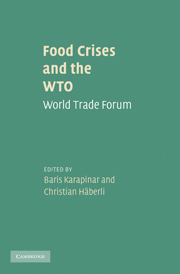Book contents
- Frontmatter
- Contents
- List of contributors
- List of figures
- List of tables
- List of abbreviations
- Preface
- 1 Introduction: food crises and the WTO
- PART 1 Economics of the food crisis
- PART 2 Trade and law: WTO and beyond
- 7 Agricultural policies: past, present and prospective under Doha
- 8 The food crisis and the role of the EC's Common Agricultural Policy
- 9 WTO disciplines and economic dimensions of the 2008 US Farm Bill
- 10 Impact of the food crisis on developing countries and implications for agricultural trade policy
- 11 Responses by the international trade and aid community to food security
- 12 Food security and WTO rules
- 13 Conclusions and policy recommendations
- Index
- References
12 - Food security and WTO rules
from PART 2 - Trade and law: WTO and beyond
Published online by Cambridge University Press: 12 May 2010
- Frontmatter
- Contents
- List of contributors
- List of figures
- List of tables
- List of abbreviations
- Preface
- 1 Introduction: food crises and the WTO
- PART 1 Economics of the food crisis
- PART 2 Trade and law: WTO and beyond
- 7 Agricultural policies: past, present and prospective under Doha
- 8 The food crisis and the role of the EC's Common Agricultural Policy
- 9 WTO disciplines and economic dimensions of the 2008 US Farm Bill
- 10 Impact of the food crisis on developing countries and implications for agricultural trade policy
- 11 Responses by the international trade and aid community to food security
- 12 Food security and WTO rules
- 13 Conclusions and policy recommendations
- Index
- References
Summary
Introduction
Food security for the solvent part of the population is essentially achieved through production and trade. Trade regulation cannot solve food crises, but it enhances or reduces the contribution of trade to food security. This chapter therefore looks at agricultural and trade policies at the national levels and their impact on the multilateral trading system. Many agricultural trade and production policies implemented by rich countries, such as market access restrictions and subsidies of various types, constitute disincentives to food production by and for the poor – especially in the food-importing developing countries themselves. As for the multilateral trading system, the World Trade Organization (WTO) is first and foremost about trade liberalisation. The 2008 food crisis has shown that the present multilateral trade rules contribute little or nothing to global food security. This is because, although the results of the Uruguay Round were a step in the right direction, the new rules and commitments hardly changed anything in terms of actual market access opportunities. A first analysis of the July 2008 proposals on the Doha negotiating table shows that the global food security situation could actually improve if the envisaged set of new disciplines and numbers is implemented. However, new rules on several key elements such as export restrictions and food aid are still extremely vague. The conclusions suggest a number of policy and trade rule reforms by which the multilateral trading system could improve global food security in a more substantial way.
- Type
- Chapter
- Information
- Food Crises and the WTOWorld Trade Forum, pp. 297 - 322Publisher: Cambridge University PressPrint publication year: 2010
References
- 7
- Cited by



